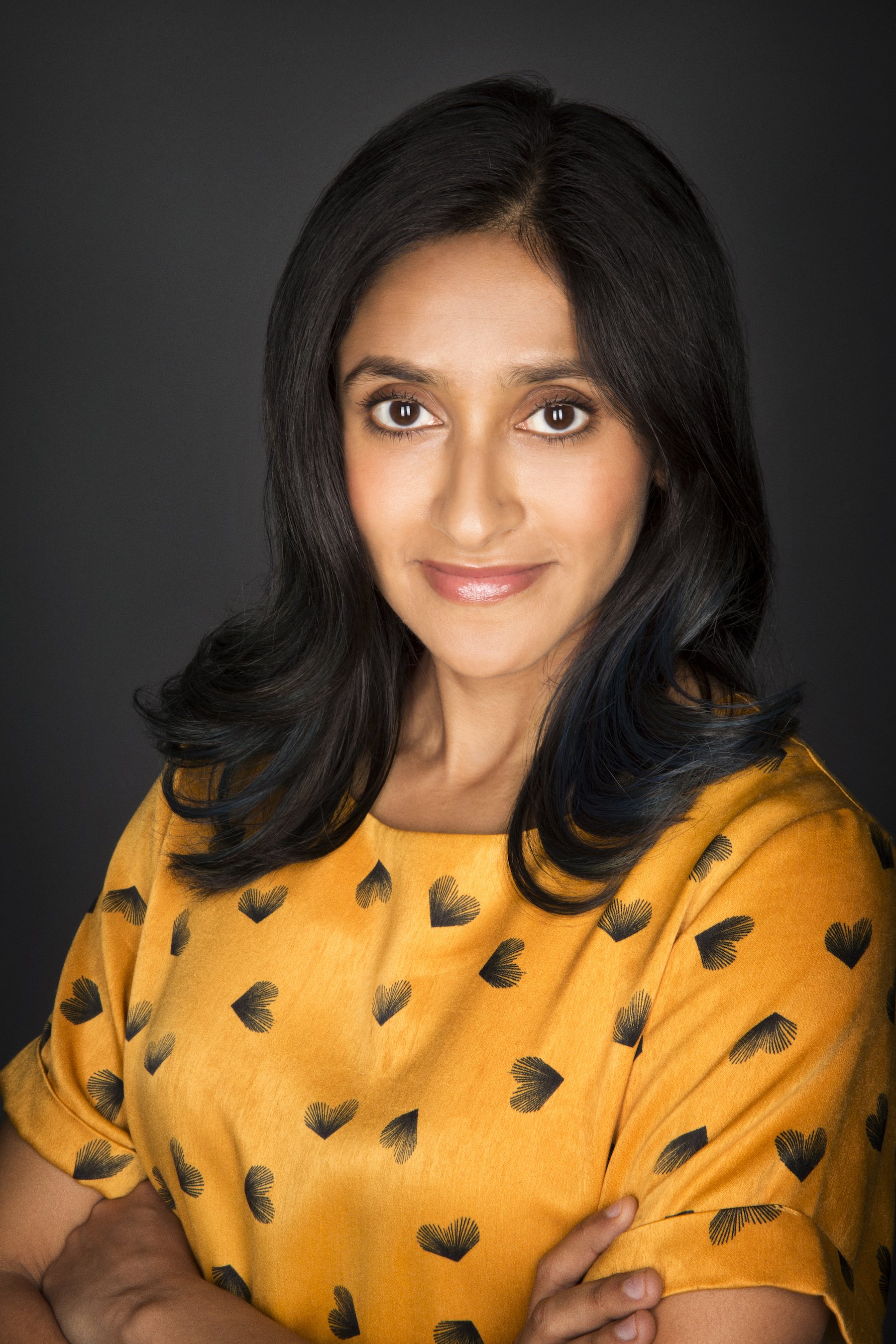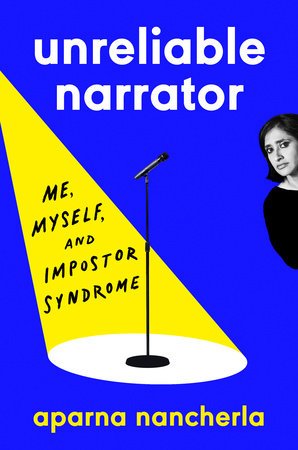Aparna Nancherla is a mighty force
On her new book, mental health, creativity and more
Aparna Nancherla is a writer, actress, and comedian who recently published her first book: Unreliable Narrator: Me, Myself & Imposter Syndrome. I know Aparna because we were on an improv team together in Washington, DC, and have been thrilled to see her career unfold over the years — from her meteoric growth on Twitter; to the TV writing jobs with Totally Biased with W. Kamau Bell and Late Night with Seth Myers, the Comedy Central special and the comedy album; to acting credits galore (see: BoJack Horseman, Master of None, and Corporate, to name just a few of many).
Aparna Nancherla; photo by Robyn Von Swank
At the heart of everything Aparna does is her distinctive voice and presence, and over the years, her openness about her mental health challenges with depression and anxiety have become a central theme. When her book came out, I of course ran out to my local bookstore to buy a copy; I wasn’t surprised by how good it was, but I was surprised by how much I related to the experiences she shared. I hadn’t realized we had so much in common, from growing up in achievement-oriented DC suburbs, to leaving college in the middle of a semester due to depression (we both eventually went back), to feeling realllllly tired of people telling us how going for a walk will make everything better (oh my god, we get it, we should love walking).
I really appreciate how deep Aparna dug in writing this book, because it meant something to me, and I am certain it will mean something to a whole lot of people. What follows are highlights from a recent email exchange.
Amanda: It seems like you attribute your courage in getting up at that very first open mic night with getting on medication for your depression — do I have that right? If so, it gets me thinking so much about the link between mental health and creative expression. With so many young people experiencing a mental health crisis right now, what creative expression — comedy, writing, other forms of art — could we be missing out on? So my question for you is: These days, how do you think about the relationship between your mental health and your creativity?
Aparna: It’s funny — my mom shared a quote with me just the other day. She only recently discovered the work of Sylvia Plath (the patron saint of depressives everywhere) — who knows what k-hole led her there…But she shared the following Plath-itude with me: “The worst enemy to creativity is self-doubt.” Perhaps rendering me the most foolish to try and write a whole book about mine, but there’s nothing I love more than rueing a challenge I brought upon myself.
I know much has been made of the connection between some types of mental illness and the creation of art out of this perpetual struggle between the artist and their own mind. In that sense, I find my own brain constantly toggles between managing my mental well-being and creative expression. The same brain that sees things as particularly, inextricably doomed or hopeless can at other times step back and frame the whole struggle as absurd, laughable, and ridiculous. It’s a constant zooming in and out of perspective, and I try to remember both things are a part of me.
We love to romanticize that the mental struggles are the pressure and the act of creating is the release, though it doesn’t always feel like that in the moment. Because sometimes depression looks like online shopping and creation looks like an internal indictment of character, or the mental illness prevents me from creating at all, so I think it’s important we not conflate the suffering as the price for creating the work.
Amanda: We met doing improv back in DC. You mention in the book that you were on an improv team back then, and I just wonder how you think about that experience... did taking improv classes or performing improv have any kind of significant effect on you? Do you find yourself using anything you learned from improv in your life or career? Or not really?
Aparna: At the risk of yes-anding your question, I found improv to be especially helpful to me both in bolstering my own confidence with being funny in front of both an audience and one’s peers, but also creating something joyful with others. I really love collaboration and improv removes some of that constant navel-gazing that can come with being a solo performer. In sharing a stage with others, I think I absorbed both other people’s performance styles and learning to acutely appreciate and work with them, but also allowing for things to happen in the moment instead of trying to hyper-control everything which is my comfort zone. Even now, it’s a muscle I have to remember to keep using, but improv taught me that it’s there.
Amanda: You talk in your book about how you've soured on social media. And I get it — how could a thinking person who lives in this culture not get it? But, and, so much of what I advocate for here at Mighty Forces is getting women to share their voices, stories, and ideas in bigger ways, especially online, where there's potential for exponential impact — as a way of taking up more space and growing women's influence over the shape of the world.
I wonder how this strikes you, and you don't have to be polite or agree with me. I'm just genuinely curious to hear your thoughts. Related: I wonder the extent to which being in Hollywood pollutes the experience of having an online presence; could it be that it's a different proposition for women who aren't part of your industry?
Aparna: I’m not sure if it was a combination of the pandemic and writing a very internal, personal book, but I have found it very hard to navigate social media as of late. And figure out what I want to do with my web presence anymore. (Note to my publisher: Besides promote my book, of course!)
I’ll be the first person to tell you that you’re one of the reasons I got on Twitter. I remember you explaining the platform to me at improv practice once and it was just the elevator pitch I needed to sign myself up. [Note from Amanda: I had no idea.] My early years on there were very gratifying and opened several doors for me. I found there was a pretty friendly community of like-minded creators and comedians wanting to have fun, but also just write jokes, and I was especially drawn to it as an introvert.
Aparna, Twitter-style
However, even then, I found the metrics-driven nature of the platform very difficult for my brain to not get caught up in. This problem only exacerbated with time, as did not being able to filter out all the noise you get the bigger your audience becomes. I suppose maybe I should have set boundaries early on about what I checked and didn’t check and how I would engage with Twitter, Facebook, and Instagram (still not on TikTok) but burnout came first. And once I stepped away from it, coming back to it felt even more confusing and overwhelming.
Currently, there’s a degree of unreality when it comes to being online where I feel very disconnected from what I read and see there, as if it’s a world I’m not fully a part of any longer. That could be my own projection, but my tolerance for being there is a lot lower than it once was. I fully agree there’s a way to reach a bigger audience and tell stories that have otherwise been marginalized in these spaces, but I have to find a way to get past the non-negotiable terms in which we're asked to exist on these platforms and lately, I can’t. By non-negotiable, I mean who runs these platforms and their own intents and interests, as well as the overall corrosive nature of spending time on them (speaking solely for my own brain).
(Read my recent article, We have an opportunity to make social media a force for good — and I want more women to get involved.)
Amanda: I think a lot about women's power — where real power really comes from, how we exercise it, what gets in the way. I wonder how you think about this. Who would you describe as a powerful woman, for example, and why?
Aparna: I constantly struggle with this question. I would say I've lived my life less in bold, brash terms or with the sort of resolve that we typically attribute to powerful women. And so I’ve often discounted myself as one, but I think the freedom to be yourself whether or not you fit into a certain type of mold is the point of being a powerful woman. On that note, I’d describe any powerful woman as one who trusts her own intuition over what everyone else is telling her, even occasionally her nearest and dearest. Even the mistakes we make can be necessary for us to learn bigger things about ourselves.
Me canoodling with Aparna’s book in my local bookstore, Oblong Books
Amanda: Since Mighty Forces celebrates diverse, authentic women's stories, I wonder if there are any books, podcasts, stand-up specials, Instagram accounts, or anything else from under-the-radar women whose voice you value, that you'd like to shout out? Maybe there's an organization doing important work re: mental health that you'd like to lift up?
Aparna: There are so many organizations and comedians doing great work these days and none of them are under the radar per se, but just in case someone doesn’t know of their work, everyone should—so I’ll name just a few here of many, many others:
Maria Bamford’s very recent memoir Sure, I’ll Join Your Cult: A Memoir of Mental Illness and the Quest to Belong Anywhere
Ziwe’s book of essays Black Friend
Cartoonist Liana Finck (on Instagram)
Data journalist Mona Chalabi (on Instagram)
The comedy stylings of Fareeha Khan, Sabrina Wu, Tina Friml, Brittany Carney, Clare O’Kane, and Nori Reed
Wellness Together: A non-profit working to provide effective mental health services to schools and their communities
Amanda: Thanks so much, Aparna. In closing, will you please do us the honor of sharing a picture of your cats, along with a caption?
“Can we help you?” Photo and caption by Aparna Nancherla
Go buy Unreliable Narrator! Sign up for Aparna’s newsletter at aparnacomedy.com! And — for now, at least! — follow her on Instagram and X. And, in parting, I give you this gift of her riffing on the experience of working from home:





